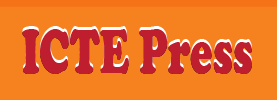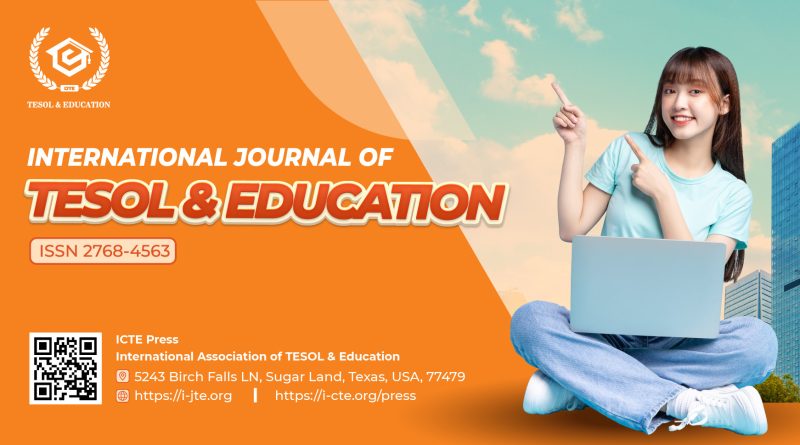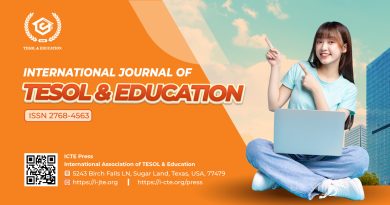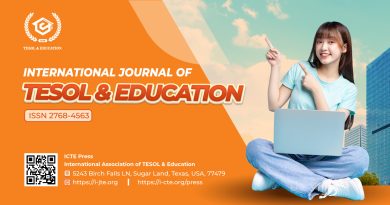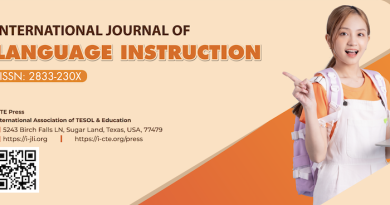TESOL & Education: Vol. 5 No. 2 (2025)
Dear beloved TESOLers & Educators,
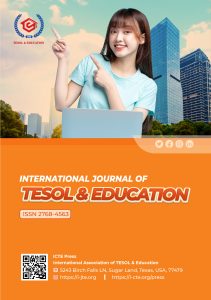 With great pleasure, we announce the successful completion and publication of Vol. 5, No. 2, 2025 of the International Journal of TESOL & Education (IJTE). This issue includes eight research papers that cover crucial topics in language education, teacher preparation, and the changing incorporation of artificial intelligence technologies in learning and evaluation. Studies on this area demonstrate how dynamic the TESOL and education sectors are. They study the intersection of artificial intelligence applications, cooperative learning approaches, and competency-based teacher preparation, providing an informed analysis of the opportunities and problems in modern education.
With great pleasure, we announce the successful completion and publication of Vol. 5, No. 2, 2025 of the International Journal of TESOL & Education (IJTE). This issue includes eight research papers that cover crucial topics in language education, teacher preparation, and the changing incorporation of artificial intelligence technologies in learning and evaluation. Studies on this area demonstrate how dynamic the TESOL and education sectors are. They study the intersection of artificial intelligence applications, cooperative learning approaches, and competency-based teacher preparation, providing an informed analysis of the opportunities and problems in modern education.
In the rapidly changing field of language education, the articles in this issue have looked into many aspects of artificial intelligence integration, cooperative learning methodologies, and teacher professional development to meet modern educational needs. Quach and Nguyen (2025) discovered significant areas for improvement in General English Teaching Programs in Vietnam by investigating lecturers’ perspectives on quality assurance (QA). Dinh (2025) used Dynamic Systems Theory to analyze the language development trajectories of Vietnamese EFL learners, revealing complicated, nonlinear processes. Yang (2025) studied the usefulness of the Fish-Skeleton Vocabulary Learning Diagram (FSVLD) combined with crossword puzzles for vocabulary retention among Taiwanese EFL students. Phan and Luong (2025) investigated the challenges that Legal English students faced while using AI approaches, focusing on ethical concerns and the danger of overreliance. Pham and Tran (2025) assessed students’ perceptions of AI language models as virtual writing assistants in terms of grammatical help and idea development, taking into account concerns about accuracy and plagiarism. While Nguyen et al. (2025) explored factors influencing the efficacy of teacher training on competency-based assessment in Northern Vietnam, Nguyen et al. (2025) conducted a systematic study of the benefits and limitations of artificial intelligence translation tools in higher education. Pham (2021) demonstrated how students’ writing fluency improved under cooperative writing structures. These publications, which address technology innovations, pedagogical techniques, and evaluation reforms, collectively contribute to the advancement of language education research.
In this context, Quach and Nguyen (2025) explored how lecturers at two Vietnamese universities perceived Quality Assurance (QA) in General English Teaching Programs (GETs). Using an explanatory mixed-methods approach and 76 lecturers, The data came from document analysis, surveys, and interviews. The results reflect varying levels of QA awareness; one university had superior QA performance. The report contains helpful information for improving quality assurance systems in Vietnamese higher education.
Dinh (2025) replicated Larsen-Freeman’s (2006) study to look into how correctness, complexity, and fluency evolved in the written works of Vietnamese upper-intermediate EFL students. Four participants’ narratives were analyzed for language development over a three-month period using a time-series methodology. The data revealed shifting trajectories that reflect DST’s view of language as a nonlinear, interconnected system shaped by contextual factors. This study demonstrates the applicability of DST concepts in EFL settings and emphasizes the need of context-sensitive language education.
Yang (2025) at Fooyin University investigated the effectiveness of integrating crossword puzzles and the Fish-Skeleton Vocabulary Learning Diagram (FSVLD) in teaching EFL vocabulary in Taiwan. The quasi-experimental design research of 71 junior college students found that the intervention group had much superior vocabulary acquisition and retention than the control group receiving standard instruction. The findings demonstrate how well visual aides and puzzles can boost long-term memory and word acquisition.
Investigating issues experienced by legal English students utilizing AI tools for legal writing, Phan and Luong (2025) at Ho Chi Minh City University of Law looked at With 42 students, the study found using a survey methodology overreliance on artificial intelligence, plagiarism hazards, and diminished originality as main concerns. Results highlight the importance of pedagogical direction in guaranteeing responsible and efficient AI application in legal writing education.
At Van Lang University, Pham and Tran (2025) asked students about their impressions of artificial intelligence language models as virtual writing helpers in English writing classes. Under a mixed-methods approach, they polled 147 students—mostly English majors. Results showed good opinions on how artificial intelligence might improve grammar, vocabulary, and idea development but raised questions about accuracy, overreliance, and plagiarism.
At University of Science and Technology – The University of Da Nang, Nguyen (2025) investigated language and knowledge content gaps in IELTS academic writing. Descriptive and qualitative techniques were applied in analyzing 202 writings from 101 engineering freshmen. Emphasizing the requirement of teaching academic vocabulary, argumentation, and cross-cultural examples in writing, results exposed substantial grammar, vocabulary, and topic deficiencies.
At the University of Social Sciences & Humanities, Vietnam National University Ho Chi Minh City, Vietnam, Nguyen et al. (2025) conducted a comprehensive review at Vietnam National University Ho Chi Minh City to investigate the benefits and downsides of AI translation tools in tertiary-level translating courses. Combining 20 peer-reviewed studies (2014–2024), they found seven drawbacks including overreliance, accuracy problems, and ethical concerns alongside eight positives including better efficiency, vocabulary, and motivation.
Nguyen, Le, and Bui (2025) looked at elements affecting the results of a seven northern Vietnamese province competency-based evaluation teacher training program. Using regression analysis, they asked 1,422 teachers about four main elements: online support following training, training organization, IT infrastructure, and training materials. The study determined that training efficacy was most influenced by online support..
Emphasizing the transforming power of combining artificial intelligence tools, cooperative techniques, and competency-based assessment methodologies, the collection of papers offers important insights into the dynamic and changing terrain of language teaching. Although technological developments—especially AI tools for writing, translation, and learning support—offer significant benefits in efficiency, vocabulary acquisition, and learner motivation across these studies, they also present challenges related to overreliance, accuracy, ethical concerns, and contextual adaptation. Especially Nguyen et al. (2025) and Phan and Luong (2025) stress the need of striking a balance between artificial intelligence support with critical thinking and human judgment to guarantee appropriate use. Likewise, Pham and Tran (2025) and Yang (2025) show that although artificial intelligence and structured visual frameworks (such as FSVLD) could increase engagement and learning gains, pedagogical support and training remain very vital for optimizing efficacy. Particularly for diverse student groups, the studies on teacher preparation—especially Nguyen et al. (2025)—showcase the vital need of post-training support, customized content, and contextual awareness. Pham (2021) supports even more the need of organized group writing in improving fluency.
These research taken together show how important artificial intelligence technology, cooperative systems, and customized teacher preparation are in developing language instruction. The findings warn against overreliance and stress the need of critical thinking, contextual adaptation, and ethics even if artificial intelligence provides efficiency and improved learning opportunities. Equitable and successful professional development depends on teacher training programs, especially those combining post-training support and culturally sensitive approaches. These efforts taken together highlight a balanced, inclusive, and learner-centered approach in tackling the difficulties of twenty-first-century education.
We especially thank all authors and their affiliated institutions for their invaluable contributions; among them are scholars from Hanoi Pedagogical University 2, Van Lang University, Fooyin University, University of Science and Technology – The University of Da Nang, University of Social Sciences & Humanities – Vietnam National University Ho Chi Minh City, and Ho Chi Minh City University of Law. We also truly appreciate the time, knowledge, and dedication of our committed peer reviewers as well as the whole IJTE editorial team to help to preserve the integrity and quality of this publication.
The International Journal of TESOL & Education is currently accepting submissions for Vol. 5, No. 3, 2025. We are seeking original research papers, literature reviews, and practical reports that cover all aspects of TESOL and education. Authors who demonstrate enthusiasm are encouraged to submit their works directly. Our website, https://i-jte.org, contains the author guidelines and submission instructions.
We look forward to receiving your contributions and continuing to serve as a platform for academic discourse and innovation in language education.
Thank you for your continued support and dedication to the International Journal of TESOL & Education. We look forward to bringing you more exceptional content in the future.
Thanks be to God for everything!
Warm regards,
Associate Professor Dr. Pham Vu Phi Ho
Editor-in-chief
International Journal of TESOL & Education
Full Issue
Research Article
Thank you for your continued support and dedication to the International Journal of TESOL & Education. We look forward to bringing you more exceptional content in the future.
Thanks be to God for everything!
